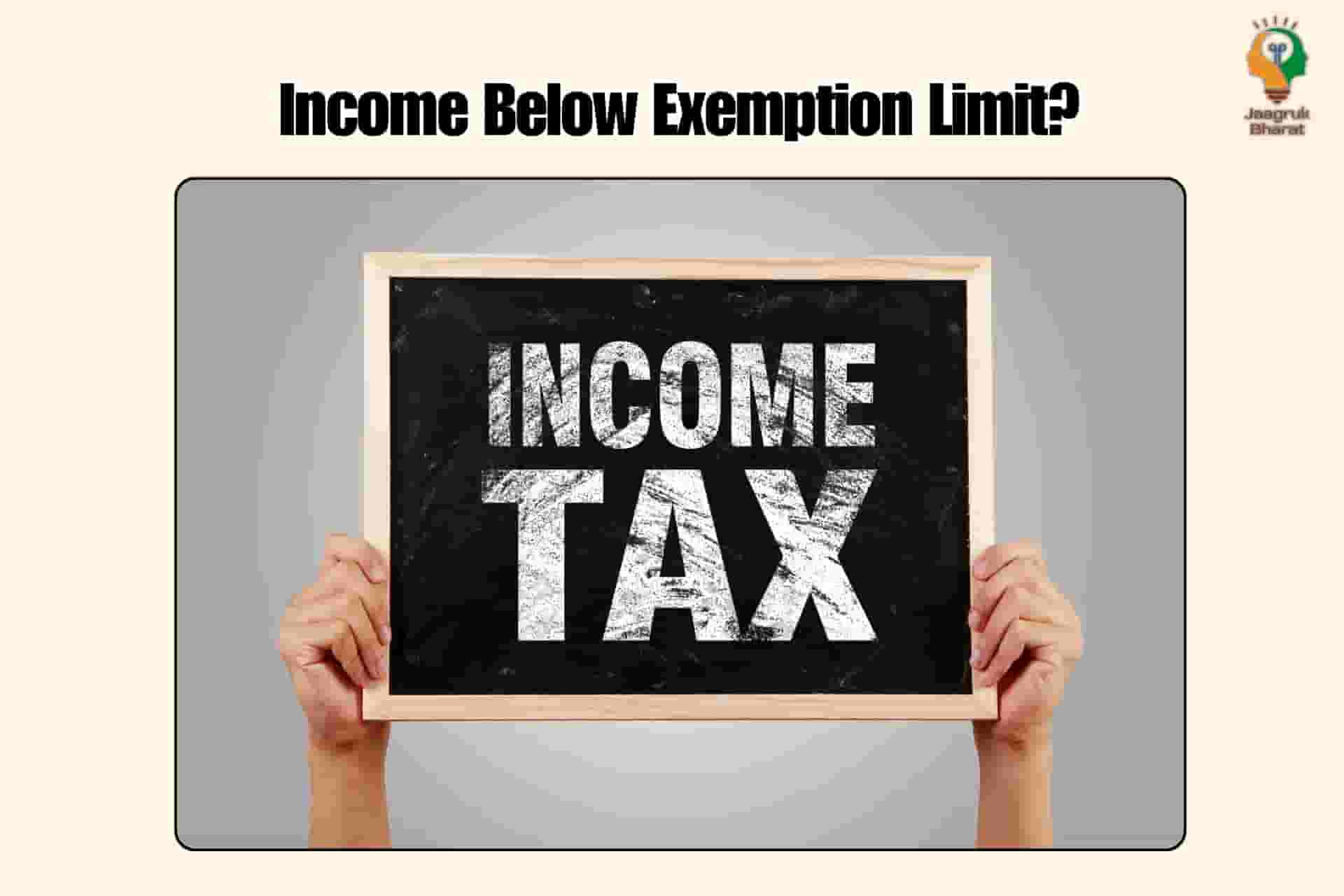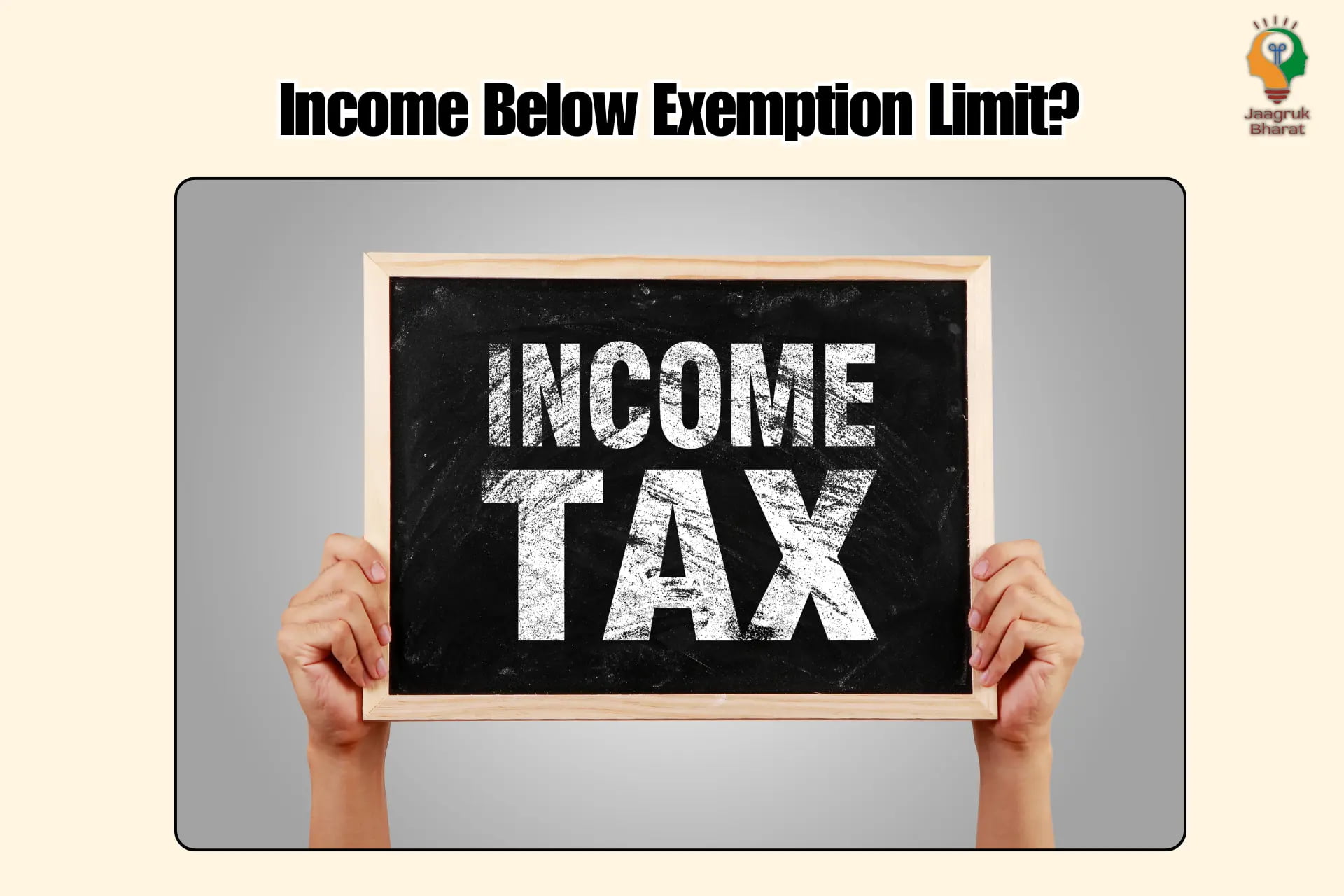Income Below Exemption Limit? Check If You Need To File ITR
Updated: 15-11-2025 at 5:30 AM
1k


The Indian taxation system follows a progressive taxation regime, which operates on the principle of “more income, more tax.” This means individuals with higher earnings contribute a larger portion of their income in taxes. However, to ensure fairness and support low-income groups, the government exempts individuals earning below a specific income threshold from paying taxes. This income bracket is known as the basic exemption limit in income tax.
Currently, India allows taxpayers to choose between the old and the new tax regimes, giving flexibility to manage their income and deductions. But a recurring question often arises — “Is it mandatory to file income tax return below 5 lakhs?” The answer depends on multiple factors, including the total income, deductions claimed, and residency status.
Overview
Here’s a simplified overview of the income exemption criteria under both taxation regimes:
| Category | Old Regime Exemption Limit | New Regime Exemption Limit (FY 2023–24) | Additional Notes |
|---|---|---|---|
| Individuals below 60 years | ₹2.5 lakh | ₹3 lakh | No tax payable below this income level |
| Senior Citizens (60–80 years) | ₹3 lakh | ₹3 lakh | Higher exemption under old regime only |
| Super Senior Citizens (Above 80 years) | ₹5 lakh | ₹3 lakh | No tax up to ₹5 lakh under old regime |
| Rebate under Section 87A | ₹5 lakh (both regimes) | ₹7 lakh (new regime) | No tax if net income ≤ ₹7 lakh (new regime) |
Latest Update
Recently, the Government of India revised the new tax regime exemption list, offering a rebate under Section 87A for individuals earning up to ₹7 lakh annually. Effectively, this means zero income tax individuals under the new regime now include those with income up to ₹7 lakh.
The government also encouraged salaried employees to adopt the new regime by simplifying slabs and reducing paperwork. However, the old regime remains optional for those claiming multiple exemptions like HRA, LTA, or 80C deductions.
The Income below exemption limit calculator available on the Income Tax Department’s official portal can help individuals check whether their income qualifies for exemption or not.
What Is The Income Criteria For Exemption From Filing ITR?
The income below tax threshold differs between the old and new tax regimes. Under the old regime, the basic exemption limit for ITR depended on age, whereas under the new regime, it applies uniformly.
-
Individuals below 60 years: Income up to ₹2.5 lakh is not taxable income in India.
-
Senior Citizens (60–80 years): Income up to ₹3 lakh is not chargeable to tax.
-
Super Senior Citizens (above 80 years): Income up to ₹5 lakh is non-taxable income in India.
-
New Regime (for all taxpayers): Income up to ₹3 lakh is below the taxable income limit.
If you’ve ever asked, “My income is below 2.5 lakhs should I file ITR?”, you’re technically exempt, but filing a nil ITR can still benefit you in many ways, which we’ll cover later.
Difference Between Old and New Tax Regimes
While both regimes offer tax exemptions, they differ in deductions and structure.
-
The old regime allows deductions like 80C, 80D, HRA, and LTA.
-
The new regime provides lower tax rates but fewer exemptions.
For instance, someone earning ₹6.5 lakh may pay zero tax in the new regime if eligible for the Section 87A rebate. However, in the old regime, deductions like PF contribution or insurance premium may still make your taxable income less than exemption limit.
Hence, choosing between regimes should depend on your total deductions, not just gross income.
Who Is Not Required to File An Income Tax Return?
The following individuals fall under the category of no income tax due to low income and need not file ITR:
-
Persons with income below exemption limit.
-
Senior citizens with income less than exemption limit under the respective age brackets.
-
Individuals whose income not chargeable to tax (such as agriculture income only).
-
NRIs whose income from India is below tax threshold.
However, the taxable income is more than basic exemption limit means you are legally required to file your ITR, even if some deductions reduce your final payable tax.
Why Exemption Limits Matter for Tax Planning?
Understanding your tax exemption limit income plays a crucial role in financial planning. It helps you evaluate whether you must file an ITR, plan deductions efficiently, and claim rebates legally.
Additionally, knowing if your taxable income is more than basic exemption limit for salaried employees helps avoid penalties or non-compliance issues. With both regimes offering flexibility, you can use an Income below exemption limit calculator or consult a tax expert to pick the most beneficial regime.
You Can File An ITR Even While Being Exempted: Benefits And More
Even if your income falls below taxable income limit, you can voluntarily file a nil ITR. This builds your income history and offers multiple advantages.
Let’s look at some of the key benefits of filing a nil ITR:
-
Proof of Income:
Essential for applying for loans, visas, or even renting apartments. It shows official proof of your annual earnings, strengthening financial credibility. -
Continuous Record:
Filing regularly creates a record of compliance with the Income Tax Department, helpful in future verifications or audits. -
Refund Claim:
If your employer deducted excess TDS and your income below exemption limit, filing ITR allows you to claim a refund easily. -
Better Financial Access:
When applying for credit cards, scholarships, or jobs, a consistent ITR record improves your eligibility and trustworthiness. -
Official Proof During Assessments:
In case of scrutiny, zero income tax individuals with regular nil filings have clear documentation showing their legitimate exemption.
Practical Example
Let’s say your annual income is ₹2.8 lakh and you have invested ₹50,000 in tax-saving instruments. This reduces your taxable income below exemption limit. Even though you’re not liable to pay tax, filing a nil ITR provides legal proof of your earnings, making it easier to apply for educational loans or travel visas later.
Conclusion
Understanding and utilising the basic exemption limit for ITR ensures compliance and strategic tax planning. Whether your income below tax threshold or slightly above it, staying informed helps you avoid penalties and optimise benefits. Filing a nil ITR voluntarily enhances your credibility, strengthens your financial record, and opens doors to opportunities that require proof of stable income.
In essence, whether you belong to the category of income below exemption limit or fall within non-taxable income India, filing ITRs — even nil ones — can benefit you significantly.
Get the latest updates on government schemes and policies with Jaagruk Bharat. Join India's biggest Jaagruk Bharat community. Share your thoughts, questions, and favourite topics with us.
Frequently Asked Questions
0
0
1k
0
0
1k Views
0
No comments available





Our Company
Home
About
T&C
Privacy Policy
Eula
Disclaimer Policy
Code of Ethics
Contact Us
Careers
Cancellation & Refund Policy
Categories
Women
Insurance
Finance
Tax
Travel
Transport & Infrastructure
Food
Entertainment
Communication
Government ID Cards
E-commerce
Traffic guidelines
Miscellaneous
Housing and Sanitation
Sports
Startup
Environment and Safety
Education
Agriculture
Social cause
Employment
Disclaimer: Jaagruk Bharat is a private organization offering support for documentation and government scheme access. We are not affiliated with any government body. Official services are available on respective government portals. Our goal is to make processes easier and more accessible for citizens.
All Copyrights are reserved by Jaagruk Bharat